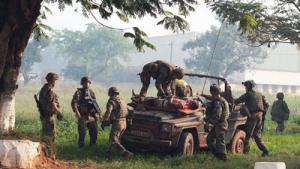African securityCentral African Republic on verge of becoming a failed state
The Central African Republic (CAR), one of the poorest countries in the world, suffers not only from mass atrocities and misrule, but also a dangerous dependence on aid, said the International Rescue Committee (IRC) in a report released the other day. Since early 2013 over half of CAR’s population has been the victim of sectarian violence which has cost over 6,000 deaths, leaving 2.7 million people in need of emergency assistance. Harvests have decreased by 58 percent and 1.52 million people are food insecure.

French troops moving an injured man // Source: shu.edu
The Central African Republic (CAR), one of the poorest countries in the world, suffers not only from mass atrocities and misrule, but also a dangerous dependence on aid, said the International Rescue Committee (IRC) in a report released the other day. Since early 2013 over half of CAR’s population has been the victim of sectarian violence which has cost over 6,000 deaths, leaving 2.7 million people in need of emergency assistance.
The report, Too Soon to Turn Away: Security, Governance and Humanitarian Need in the Central African Republic, documents the risks that civilians and aid workers face daily, while projecting what food and shelter needs could be through the end of 2015 according to different levels of violence and funding.
“The Central African Republic needs a new start, or it will become the case study of a failed state,” said David Miliband, president and CEO of the International Rescue Committee. “The scale of humanitarian suffering, fueled by a complete lack of law and order, is happening far from the spotlight but endangers an already fragile and dangerous region. Underfunded humanitarian aid programs are a lifeline for more than half the population, but they need more and different help.”
The IRC says that the report is based on field research conducted in the Central African Republic in March 2015 and draws on surveys and interviews with conflict-affected Central Africans. It recommends that while immediate humanitarian aid is critical to saving lives, comprehensive international investment and diplomatic engagement should address the root causes of conflict, provide security in ungoverned space, and plan for sustainable economic development.
According to UNHCR, 465,824 people have fled the country to already fragile neighboring states to escape persecution. The situation of the country’s 458,000 internally displaced people is desperate: 39 percent live in camps which are makeshift, overcrowded, and remain dangerous. Sanitation is poor and access to clean water is limited, threatening to spread disease. Overall, the crisis has had the following devastating impact:
- 80 percent of health facilities that remain open depend on humanitarian aid
- Harvests have decreased by 58 percent and 1.52 million people are food insecure
- The IRC received over 1,500 reports of gender-based violence, of which 71 percent were rapes
- 454,634 tons of food have been pillaged before reaching people in need
The International Rescue Committee has been on the ground in CAR since 2006.
ICR notes that CAR cannot break the decades-long cycle of violence and humanitarian need without serious investment in strengthening governance and security. The pact adopted by over 700 local leaders and parties to the conflict at the Bangui Forum in May 2015, if properly implemented, offers a roadmap toward peaceful recovery. The Central African Republic is due to hold presidential and parliamentary elections on 18 October and 22 November 2015.
— Read more in Too soon to turn away: Security, Governance and Humanitarian need in the Central African Republic (International Rescue Committee, July 2015)
